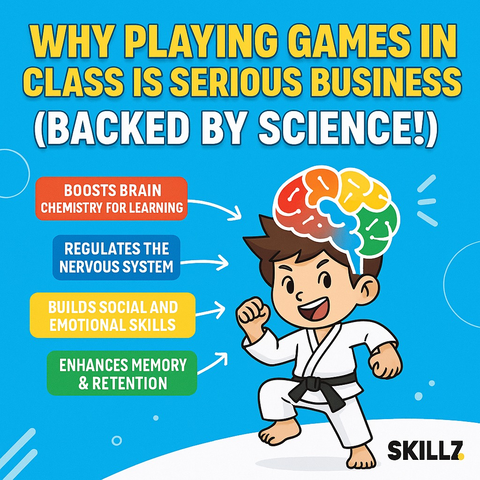Martial Arts as Functional Fitness

When most people think of martial arts, they picture high kicks, fast punches, or epic sparring matches. But martial arts is so much more than fighting — it’s a full-body workout that strengthens your body, sharpens your mind, and improves your everyday movement.
Whether you’re a kid just starting out, a teen looking to get stronger, or an adult wanting a fun way to stay fit, martial arts is a complete fitness system that works for everyone.
1. Strength: Build Muscles That Help in Real Life
Martial arts uses your whole body, not just one muscle at a time:
- Punching and kicking drills work your arms, core, and legs together.
- Stances and footwork drills strengthen legs and glutes, perfect for running, jumping, or sports.
- Bodyweight exercises like push-ups, squats, and planks are built into training for strength that really matters.
Why it’s cool for kids and teens: Instead of boring gym machines, kids learn to move their bodies efficiently while having fun.
2. Cardio: He...
5 Signs Your Child Is Ready to Level Up in Their Training

How to tell when your young ninja is prepared for the next challenge
As parents, watching your child grow through martial arts is one of the most rewarding parts of the journey. You see the focus developing, the confidence rising, and the excitement every time they put on their uniform. But at some point, many parents wonder:
“How do I know when my child is ready to level up?”
At Xtreme Ninja, leveling up isn’t just about kicking higher or moving faster. It’s about growth — in discipline, maturity, mindset, and skill. Here are five clear signs your child might be ready for their next belt or training level.
1. Their Focus Has Improved Significantly
Kids don’t need to be perfect listeners to progress but you’ll notice a shift when they’re ready to level up.
If your child has started:
- Staying engaged through drills
- Following directions the first time
- Paying attention to corrections
- Handling class distractions better
…they’re showing the mental discipline needed for the next...
Host the Ultimate Birthday Party at Xtreme Ninja Martial Arts!

Looking for birthday party packages in Medford that your child will never forget?
At Xtreme Ninja Martial Arts, we’ve turned birthday parties into an epic, action-packed experience that’s stress-free for parents and unforgettable for kids.
Our parties are the talk of the town — combining fun martial arts lessons, interactive games, and special moments that make your child the star of the show.
Why Choose a Martial Arts Birthday Party?
Planning a birthday party can be stressful… but not at Xtreme Ninja!
Our martial arts birthday parties are designed to be fun, active, and 100% worry-free for parents. Here’s why families love celebrating with us:
- Interactive Games & Activities: Our experienced instructors lead the party, engaging kids with games, challenges, prizes, and exciting martial arts lessons.
- All-Inclusive Package: Enjoy 3 large cheese pizzas, waters for all the kids, paper products, utensils, and goodie bags filled with candies, ninja stickers, and more!
- Special Moments...
What Parents Should Know Before Their Child Starts Muay Thai

So, your child is interested in Muay Thai, that’s awesome!
Whether they’re drawn to the powerful kicks, the fast-paced action, or the idea of becoming more confident and focused, Muay Thai can be one of the best activities for kids to grow physically and mentally.
Before their first class, here’s a quick guide to help you (and them!) feel prepared and excited for what’s ahead.
1. It’s About More Than Just Kicks and Punches
While Muay Thai is known as “The Art of Eight Limbs,” training goes far beyond striking. Kids learn discipline, respect, self-control, and perseverance. Values that carry over to school, home, and friendships.
Classes are designed to be structured yet fun, helping students build coordination, focus, and confidence through positive reinforcement and teamwork.
2. Every Student Starts Somewhere
No experience? No problem. Our beginner classes welcome all levels. Coaches break down techniques step by step and make sure every student learns safely at their own pace.
We fo...
Is Martial Arts Right For My Child?

If you’ve ever caught your child throwing playful punches in the air, practicing “ninja moves,” or showing a little extra energy around the house — you’ve probably wondered if martial arts might be a good fit.
The short answer? Most likely, yes.
But as parents, it’s normal to want to understand exactly how martial arts helps your child grow — physically, mentally, and emotionally before stepping onto the mat.
Here’s your simple guide to help you decide if martial arts is right for your child (and how to get started the right way).
Martial Arts Builds More Than Muscle
Sure, kids learn kicks, punches, and self-defense but what they really build is strength, balance, coordination, and body awareness.
Every movement is designed to improve motor skills and flexibility while keeping things fun and active. It’s one of the few activities that challenges the whole body and mind at once, perfect for kids who need a healthy outlet for all that energy!
It Teaches Focus and Discipli...
Self-Defense & Martial Arts

When you think about signing your kids up for activities, what comes to mind?
Soccer, dance, piano lessons maybe?
Those are all great, but there’s one thing that often gets overlooked and it might just be the most important skill your child could ever learn: self-defense.
Now, we’re not talking about teaching kids how to fight or be aggressive. Self-defense is so much more than that. It’s about awareness, confidence, and knowing how to handle themselves if a tough situation ever comes their way.
And here’s the thing—waiting until something happens before giving them these skills is like waiting until they’re drowning to teach them how to swim.
Why Self-Defense Matters
Let’s be honest, kids today face challenges we didn’t always have to deal with. From bullying at school to simply walking home from practice, the world can feel unpredictable.
As much as we’d love to be by their side 24/7, we can’t.
But what we can do is equip them with tools that stick with them wherever ...
The Ultimate Confidence-Building Tool: How Martial Arts Builds Unshakable Confidence in Kids

As parents, we all want the same thing: happy, confident kids who can handle life’s challenges without shrinking away.
But here’s the thing… Confidence isn’t something we can simply give our kids.
It’s something they have to earn, through real experiences, small wins, and yes, sometimes a few bumps along the way.
That’s where martial arts comes in.
At Xtreme Ninja Martial Arts, we see shy, quiet kids transform into self-assured leaders not because we hand them a black belt, but because they work for it. Every class is a chance for them to face a challenge, push through, and realize, “Wow, I can actually do this!”
Why Martial Arts is the Ultimate Confidence-Building Tool
- Small Wins That Add Up
Whether it’s nailing a new kick or breaking their first board, martial arts gives kids tangible goals and the thrill of accomplishing them. Each achievement stacks on the last, building real, earned confidence not the “good job for showing up” kind. - Speaking Up Without Fear
We encour...
Building Leadership in Kids: Without Pressure or Perfection

Every parent wants their child to grow into a confident, capable leader…
But here’s the thing: leadership isn’t something kids just “have” or don’t—it’s something they grow into.
And sometimes, when we try too hard to teach it, we accidentally put pressure on them to be perfect, instead of encouraging progress.
The Problem: Kids Are Overstimulated… But Under-Coached
In a world where kids are constantly being told what to do but rarely how to grow, it’s easy to see why leadership can feel intimidating for them. Some kids shrink back in group settings. Others don’t know how to handle failure, take initiative, or speak up when it matters.
Parents often ask:
“How can I help my child be more confident?”
“What do I do if my child avoids responsibility?”
“How do I raise a leader without overwhelming them?”
The Real Answer? Put Them in the Right Environment
Kids don’t need pressure to lead, they need space to practice leading.
That’s why environments like martial arts-based camp...
Summer Brain Gains at Xtreme Ninja

How Martial Arts Keeps Kids Sharp, Strong, and Smiling All Summer Long
When summer hits, there’s one big question on many parents’ minds:
“Will my child lose momentum while school’s out?”
The short answer? Yes — unless we do something about it.
It’s called the Summer Slide — a real and well-documented dip in academic and social development that happens during long school breaks. Kids can lose months of progress, not just in reading and math, but in confidence, focus, and emotional regulation too.
But here at Xtreme Ninja, we believe summer shouldn’t slow kids down. It should launch them forward.
That’s why our martial arts programs are designed with science, movement, and fun to help students grow stronger mentally, physically, and emotionally — even when school’s out.
Let’s break down how we fight the summer slide with purpose-built training for real growth:
1. We Fuel Brain Chemistry that Supports Learning
Every time your child trains at Xtreme Ninja, their brain get...
Why Martial Arts Classes End with a Game (and Why It’s Backed by Brain Science)

If you’ve ever sat through a kids' martial arts class and thought:
"Why are they playing games instead of practicing more punches and kicks?" — You’re not alone.
And you’re not wrong to wonder. But here’s something many people don’t realize:
The games at the end of class aren’t a break from learning —
They are learning.
When intentionally designed, games become one of the most powerful tools in child development. They help strengthen the brain, support emotional growth, and build meaningful connections between kids, instructors, and peers.
Let’s break down the science behind why ending class with a game is more than just fun — it’s a game-changer for your child’s development.

1. Games Trigger Brain Chemistry for Learning
When kids laugh, connect, and feel safe during a game, their brains release a powerful cocktail of chemicals known as D.O.S.E.:
- Dopamine (for motivation & reward)
- Oxytocin (for connection & trust)
- Serotonin (for emotional balance)
- Endorphins (for jo...
